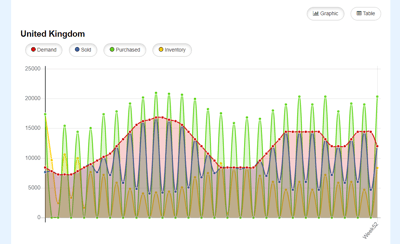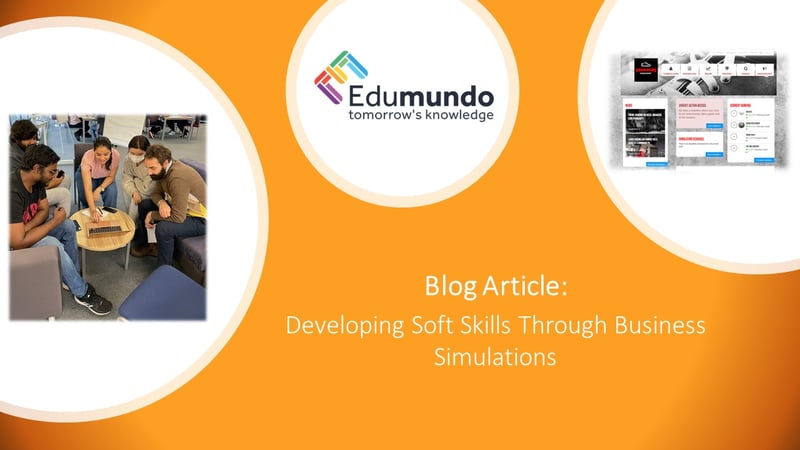"Students tend to develop a lot of skills through the application of theoretical elements in the simulation."
Alessandro Ferrazza, Lecturer in Postgraduate Business, University of Sunderland in London
Using business simulations for educational purposes can provide learners with opportunities to apply some of the "hard skills" of particular subjects and put them into practice within a realistic context. It can, as Dr. Dhruba Lahiri of Royal Holloway University of London states: "...also expose students to what they don't know or should know about running a business" enabling them to identify knowledge gaps and address them during their studies.
However, while developing "hard skills" remains a key criteria amongst graduate employers, of equal importance, and some would argue more so, is how students develop the soft skills required for the demands of the professional workplace.
In this blog article we identify four key soft skills students can develop by taking part in a business simulation exercise.
1. Communication Skills
Good written and verbal communication skills are a crucial requirement for almost every graduate employer. During a business simulation exercise students develop a range of communication skills. We've identified four that stand out:
- Interpersonal - the ability to adapt how we communicate with people based on different contexts and using emotional intelligence. For instance, we have observed how fellow students use more motivational language towards team
 members who appear disengaged in order to encourage their participation or how one or more members will seek to mediate a situation where conflicting opinions arise.
members who appear disengaged in order to encourage their participation or how one or more members will seek to mediate a situation where conflicting opinions arise. - Influencing - how we present our own opinions on taking a particular course of action without enforcing it through intimidation or ridiculing others. This takes place throughout the simulation exercise but in particular during rounds that require responses to changes in the market where students will seek to influence team members on where they think their company needs to invest or cut costs in order to improve company performance.
- Negotiation - Similar to influencing above, students often have to determine a course of action that may go against some of their opinions on what decision to make. Effective negotiators expect trade-offs but can also encourage team members to agree upon some of their own thoughts on the best decisions.
- Public speaking - This typically takes place during the assessment stage of the simulation exercise where Lecturers often ask students to do a group presentation about their business, reflecting on what worked well and what did not and how they see their company performing in future quarters/years.
Commonly during the assessment phase students are also required to demonstrate their written communication skills. For example, on Nick Pronger's 'Marketing Simulation' module at Birkbeck University of London, after the simulation exercise individual students are tasked with designing their company's own Marketing Strategy for the year ahead. Here they need to apply strategy models and concepts provided in the simulation as well as from other modules, and apply it to their company.
2. Analytical skills
This year's 'Campus Skills Report' from Coursera placed a strong emphasis on developing students' data fluency skills. This came from feedback from a large number of graduate employers who felt students were under-skilled in this area amongst a growing reliance on data-driven strategies and decisions in business.
Students get an opportunity to interpret data within a realistic environment during a business simulation exercise. Here students analyse a variety of data sets such as stock levels, sales trends, revenue, profit, balance sheets, stock market index, and market share to name a few.
simulation exercise. Here students analyse a variety of data sets such as stock levels, sales trends, revenue, profit, balance sheets, stock market index, and market share to name a few.
Students need to interpret this data well in order to make informed decisions during each round: the decisions they make impact on numerous data sets so one look at the data is not enough, they need to be continuously reviewing them and acting upon their interpretation of the data.
With data-driven experience becoming more vital, the business simulation exercise provides a valuable learning opportunity for students to apply their analytical skills and highlight any knowledge gaps they have on data analysis.
3. Team-working
Being a "team player" is a very crucial attribute. The vast majority of employers know the importance of fostering a good team spirit among their employees and how this correlates to improved professional performance. Being a good team player though is something that often needs development due to differing learning and communication styles and motivations.
-1.jpeg?width=248&name=WhatsApp%20Image%202021-11-24%20at%209.23.09%20AM%20(1)-1.jpeg)
In the Business Simulation environment students are placed into teams to manage a fictional company. It's here where they compete against fellow student teams to earn points within the simulation with the aim of finishing as high-up the 'balanced scorecard' as possible.
In our experience, it's key to provide incentives to encourage effective team-working. In our simulations exercises we hold intervals after each round to check on the 'balanced scorecard' and we also reward certificates for first, second, third place, and for all participants in the simulation. These certificates can then be shared on LinkedIn and endorsed by the Edumundo Operations Team.
In this team dynamic, students are able to find out what kind of team-player they are: a leader, a mediator, an active-listener etc. and what motivates them to be an effective team player.
4. Project Management
Similar to communication skills, project management encompasses a number of valuable soft skills that students can harness during a business simulation exercise. These include:
- Time-management and Prioritisation - As each round of the simulation has time-specific deadlines, students need to work both during workshops and off-campus to design their strategy and make their operational decisions before each deadline.
- Task Management and Delegation - Within these deadlines effective teams are able to delegate certain tasks, or 'actions', to certain team members and ensure the workload is evenly split. Tasks should also be clear and concise to avoid any confusion on what's required and by whom.
When it comes to deciding the team's management structure, some select a team member to be the Project Manager of the simulation exercise. In this role they track the status of all delegated tasks and report any risks and issues when they meet up to work on the simulation.
Teams that adopt this approach are often able to clearly detail the rationale behind their strategy and every decision made during each round. This is particularly useful for assignments where they can resort to recorded notes from previous meetings to articulate and clearly evaluate their company's performance.
Career Paths
The added bonus from using business simulations is that is also exposes students to realistic accountabilities and remits of particular professions. For example, students studying International Business may find they enjoy more of the financial aspects of the simulation and so may seek careers in finance-related professions after their studies.
It gives them a 'taster' for the professional workplace environment prior to graduation or before undertaking a placement year in industry.
Interested in Using Business Simulations?
Click on the button below to view our catalogue.
Case Studies
Check out our library of case studies to see how our academic partners have used simulations in their teaching.



.png?length=300&name=unnamed%20(11).png)
.png?length=300&name=unnamed%20(7).png)
.png?length=300&name=unnamed%20(8).png)
.png?length=300&name=unnamed%20(6).png)

.png?length=300&name=unnamed%20(10).png)
.png?length=300&name=unnamed%20(5).png)
.png?length=300&name=unnamed%20(9).png)
.png?length=300&name=unnamed%20(4).png)
.png?length=300&name=unnamed%20(2).png)
.png?length=300&name=unnamed%20(1).png)
.png?length=300&name=unnamed%20(3).png)
.jpg?length=300&name=unnamed%20(2).jpg)





.png?length=300&name=loughborough-university-logo%20(small).png)





